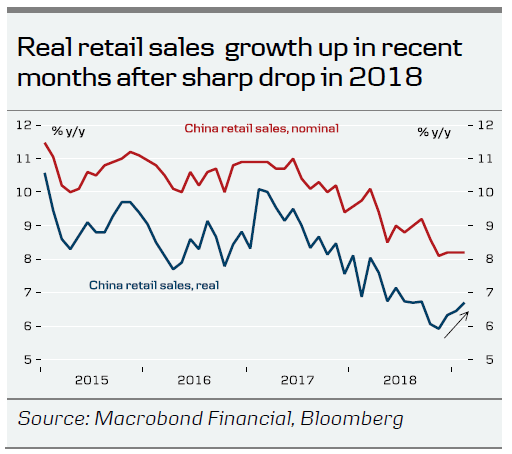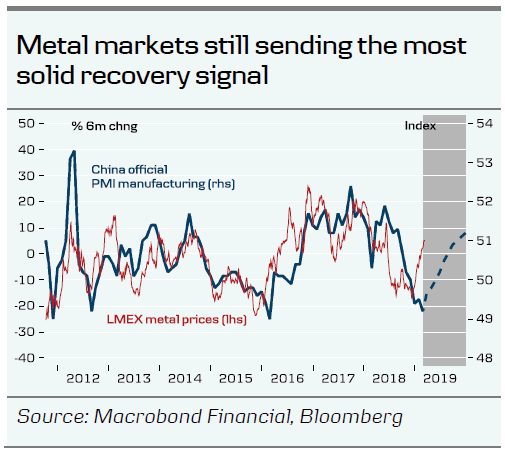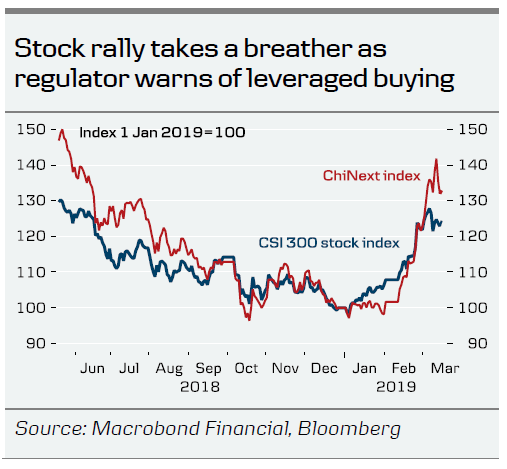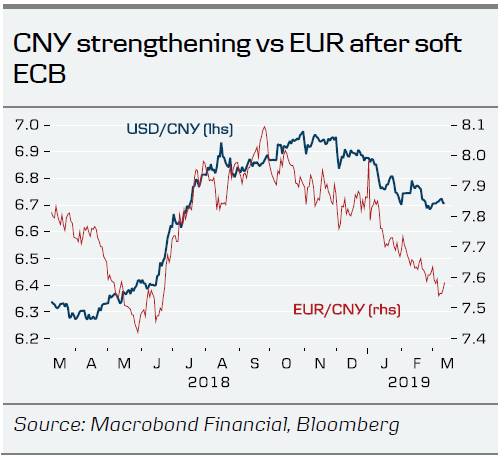- Xi-Trump summit in April at the earliest, according to sources.
- Data for Jan/Feb was mixed but leading indicators still point to recovery.
- Stock markets take a breather as regulator sends warning.
Xi-Trump summit delayed to at least April
Sources close to the trade negotiations said on Thursday that a summit between Donald Trump and Xi Jinping would take place in April at the earliest , see Bloomberg 14 March. According to the article, Xi’s staff is no longer planning for a flight to Florida after a planned visit to France and Italy at the end of this month.
Speaking on the trade negotiations on Wednesday, US President Donald Trump told reporters that “things are going along very well ” and “I think the deal is going to be made… but we’ll see what happens “. However, he also stressed that he is in no hurry to make a deal, referring to those accusing him of rushing a deal, see Reuters 13 March. Trump also told reporters that he preferred to finish the deal at a summit with Xi but was also open to competing the deal beforehand and instead meet for signing the trade deal. Former economic adviser Gary Cohn said in an interview that Trump is ‘desperate’ to sign a deal with China, see Bloomberg , 14 March.
On Friday, the National People’s Congress approved a new foreign investment law aimed at levelling the playing field for foreign companies and increasing protection of intellectual property rights, see SCMP , 15 March. This would come into effect on 1 January 2020. The law was first introduced as a draft in 2015 but in the past three months, it has been rushed through to accommodate US demands in the trade talks.
Comment: As we wrote last week , things are bound to get trickier at the end of such negotiations with so much at stake , see China Weekly Letter – Trade deal to face hurdles, closer to the finish line , 7 March. It seems the US wants an enforcement mechanism in which they can re-impose tariffs on China if they believe China is not honouring the deal, without China being allowed to retaliate. No Chinese president could sell such a deal domestically. China prefers an independent body such as the WTO to be the judge of any breach, which is a no-go for the US. A compromise needs to be found.
Xi will not agree to a summit unless a deal is more or less completed . Trump’s comments that he could walk from a deal if it is not good enough has created anxiety on the Chinese side. Xi cannot risk giving Trump the honour of hosting a summit in his own resort and then come home without a signed agreement. We probably have to wait for trade talks to be more or less finished before a summit would be announced. This may take some time. Ultimately, we still firmly believe a deal will be made, though , as Trump needs a deal for his campaign for the 2020 Presidential elections, which kick off soon. Failure to reach a deal would lead to sharp declines in equities and China would stop buying soy beans, etc., which would hurt voters in important swing states. In our view, it is unlikely that Trump would choose that path.
Mixed data for Jan/Feb but leading indicators still improving
Chinese data for industrial production, retail sales and fixed asset investments was a mixed bag, see Flash Comment China – Q1 was weak but leading indicators point to a bottom, 14 March. The surveyed unemployment rate jumped from 4.9% in January to 5.3% in February. On a more positive note, the Chinese Customs chief Ni Yuefeng reported that China’s exports for the first nine days of March were up 39.9% compared to the same period last year, see SCMP, 11 March. Metal prices are also still hanging on to the gains seen recently, thus still supporting a picture of bottoming growth.
Comment: The data this week does not change our view that growth was weak in Q1 but that is also likely to be the low point for growth. The jump in the unemployment rate is interesting, as we are not used to big changes in unemployment. However, it fits well with the picture of a slowdown – and possibly also some distortion from Chinese New Year. We look for stimulus measures to kick in with more force as 2019 unfolds and a trade deal should also reduce a big cloud of uncertainty. Although the tech war is set to continue, it will have less economic impact. We also doubt Trump would dare to reignite the trade war in the middle of an election campaign, where he needs the tailwind from strong markets and a robust economy.
Stock markets take a breather
Chinese equities hit a few more road blocks this week. On top of more mixed signals in trade talks, the Chinese regulator also warned brokerages to minimise the risks from margin lending and warned “analysts to avoid inflammatory language”, see Bloomberg, 14 March. In particular, the ChiNext small cap index of mostly technology companies took a beating, falling 7% overall on Wednesday and Thursday. It is still up more than 30% this year, though, following a very strong performance in February.
Comment: We see the declines as a healthy correction and would not rule out further declines in the short term; especially if doubts creep in regarding a trade deal. However, in the medium to longer term, we see more upside in Chinese stocks on the back of a gradual economic recovery and accommodative monetary policy.
Other China news of the week
The CNY has been stable this week with USD/CNY around 6.72. We look for the declining trend to continue over the next year, albeit at a slower pace than seen in the past months.
An EU Commission paper released this week takes a tougher stance on China. In what is called ‘A strategic outlook’ communication, the EU Commission describes China as a ‘systemic rival’ and ‘economic competitor’. It recommends a common EU approach to the security of 5G networks and heightened awareness of security risks in critical assets, technologies and infrastructure. While critical in some areas, the paper also recommends strengthened engagement and cooperation. The paper is the position of the EU Commission and not the European Council.
Voices of criticism of key Chinese policies at NPC, see SCMP, 13 March. The most outspoken has been Lou Jiwei, the chairman of the National Council for the Social Security Fund and previously finance minister. He called the ‘Made in China 2025′ policy a waste of taxpayers’ money. The remarks contradict the criticism often heard that there is no room for debate in China. Although there is clearly a limit in how far you can go.




